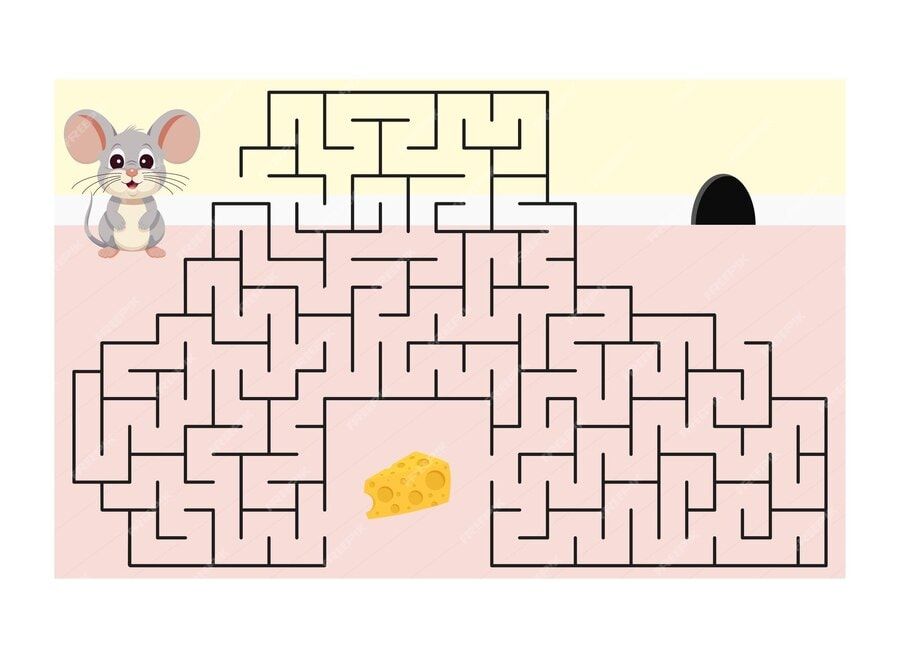Systems vs Goals: Which Path to Choose for Success
You can meet any goal you have if you set the right systems in place
Imagine yourself as a rat in a maze. Your goal is to get to a block of cheese at the other end--how do you do it? The answer, you may think, is fairly obvious--you keep moving down a path a little bit every day till you reach the cheese. If you hit a wall, you pause and pivot. But did you realize that it's not the goal of having cheese that made you put in consistent effort, but the simple system you created to make progress a little at a time?
All the great productivity experts today will probably agree that in the systems vs goals debate, systems come out on top. This is because while goals may be outcome-oriented, unrelenting, and change with time, the systems that you create to achieve success will help you always stay productive and ready for any challenge life throws at you.
Want to know more about how to work with goals and systems? Read on:

Understanding Goals and Systems
Scott Adams, author of the successful productivity book How to Fail at Almost Everything and Still Win Big probably explains it best:
"If you do something every day, it's a system. If you're waiting to achieve it someday in the future, it's a goal."
Essentially, the big differences between goal setting and systems creation are timing and motivation. While set goals are a future outcome you're working towards, systems are engine that you keep you moving towards them. Let's see a few examples:
If you're a student who wants to become a doctor, then passing your final exams is your long-term goal. The studying you do every day to prepare for this exam becomes your system.

If you're an athlete in a team sport, winning the national championship is your, and your team's, ultimate goal. The practice, exercise, and drills you all do every day become your collective system.
Your goal can even be recurring and continuous, such as losing weight and improving your daily diet. How you exercise and meal prep every day then becomes your system.
Now, you may say that you wouldn't need these systems if you didn't have the corresponding goals. But it's actually the opposite--without systems and motivation, you cannot sustain your goals!
Why Goal-Oriented People need Systems
Goals are Limiting
Goals are all about the result, never about the journey. Goal-oriented people often focus on the prize they get at the end, rather than the process of getting there. This way, they may narrow their vision and deprive themselves of the opportunity to learn new and exciting things.
Goals Create Pressure
Ambitious goals can be overwhelming and create a sense of pressure that overtakes people's drive to meet them. This will just cause them to lose motivation and momentum fairly quickly. The goal, then, will be left pending or even abandoned, leading to further disappointment and frustration.
Goals lead to a Failure Mindset
Goal-oriented thinking can lead to permanent failure, because people often believe that until they've not met their goals, they're "losing". And if by chance the goal needs to be abandoned, they may simply become too unmotivated to try and move forward and try new goals.

Why Systems People Succeed
Systems Focus on Continuous Improvement
Systems are all about the journey and about creating habits that lead to overall development. Whether the processes are focused on a particular goal or not, they all help build useful practical skills.
Systems Keep Up Motivation
Consistency always leads to positive results, even beyond the actual goal, which act as natural motivators to help you keep moving forward and get better.
Systems and Success Go Together
People may think that until they meet their goals, they're failing. But systems are all about making the effort, so every day the process is followed is automatically a win!

So you see, creating good systems trumps mere goal setting. Maybe this is why James Clear, author of Atomic Habits, a great book on the growth mindset, says:
“We don’t rise to the level of our goals; we fall to the level of our systems.”
Creating Effective Systems with your Goals
Set Actionable Goals
The first step to creating good systems is to find the right direction for them. The goal that you make for them must be SMART--Specific, Measurable, Achievable, Relevant/Realistic, Time-bound--which will automatically help you find a clear direction.
For instance, If your goal is to lose weight, create and write your SMART goal like this:
I will lose 50 pounds by exercising every day, eating less junk food, and weighing myself once a week for three months.
Want more help creating SMART goals? Try our helpful tool, Crunch!
Develop Habits
Consistent effort means you need to develop a habit of following your systems every day, even if you're doing the bare minimum. If you want to exercise every day but are sometimes too tired to go to the gym, try to aim for light home exercises or a short run instead. The idea is to follow the process and adapt as you go.

Repurpose Existing Systems
Systems have an added advantage of being flexible and adaptable. Suppose, as a student, you created a habit of having a focused study session in the mornings and it worked well. Now as a professional, if you find yourself struggling to complete a long-term project, why not use your morning work sessions to get it done?
Get Accountability
Systems and habits are much easier to follow through on when there's someone else keeping tabs. Get yourself a workout partner, a study buddy, a goal accountability app, or just make a commitment to a friend or family member that you will follow your daily habits and systems regularly. You can also get started with an accountability partner (like us) who'll keep an eye on everything you do!
Take Time to Review
Once you start on your journey, take time to pause and reflect on the steps you've taken up until that point. Ask yourself whether your goal has changed, whether the systems are working and teaching you something, or whether there's a need for a change. These reviews will also keep you motivated as you see how far you've come and give you a chance to celebrate your success so far!
How BaaS Helps you Create Systems
Looking for some help to create systems, stick to them, and periodically measure your progress? Join Boss as a Service. Our bosses will assess your goals, progress and the hurdles in completing them, and help you create effective systems to get where you need to be! And as we move along, we're also here to remind you of your wins and keep you moving forward!
Final Thoughts
Creating systems should be your biggest goal--the one that leads the way for achieving all your future successes!